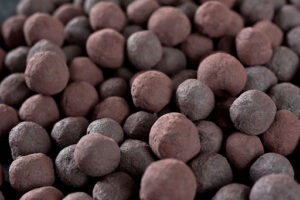
Mining company Ferrexpo plc with assets in Ukraine produced 901,000 tons of pellets in January-March this year, down 67% from the same period last year.
According to the company’s stock exchange statement on Thursday, the production of pellets in the first quarter of 2023 increased 2.16 times compared with the fourth quarter of 2022 (in October-December last year – 417 thousand tons).
In 2023, only pellets with iron content of 65% were produced.
The total production of commercial products (pellets and iron ore concentrate) for the first quarter of this year decreased by 65% by the first quarter of 2022, but increased 2,1 times to 954 thousand tons by the fourth quarter of 2022. Including commercial concentrate output in January-March 2023 amounted to 53 thousand tons (+32% compared to the previous quarter).
The press release explains that the increase in pellet output in the first quarter of this year was due to the improved power supply, which allowed to restart the second pelletizing line at the end of February 2023. At the same time, the decrease in the group’s production compared to last year is due to operational and logistical constraints since the start of Russia’s full-scale military invasion in February last year.
The company continues to focus on high iron content products.
The Group intends to continue to operate one to two pellet lines in the next quarter, as in the first quarter of 2023, provided there are no further significant changes in the operating environment and logistics availability in Ukraine.
Total iron ore sales were 0.85 million tonnes during January-March 2023 with shipments to European customers by rail and barge.
Ferrexpo CEO Jim North commented that pellet production of 0.9 million tons during the first quarter of 2023 represents a significant increase over the previous quarter and reflects the easing of operational constraints experienced late last year.
“As noted in our recent full year results announcement, we are now able to operate our second pelletizing line (of four) and our logistics networks are able to provide sales volumes to customers in line with this level of demand. Going forward, we aim to balance production volumes with a conservative approach to maintain group balance and liquidity metrics, ensuring stable deliveries to our long-term customers,” North was quoted in the press release.
As reported, Ferrexpo produced 6.053 million tons of pellets in 2022, down 46% from 2021. At the same time, pellet production in the fourth quarter of 2022 decreased by 86% from the fourth quarter of 2021, and by September-December 2022 decreased by 50% to 417,000 tons.
Production of premium pellets with 65% iron content in 2022 was 5.7 million tonnes (down 47%), including 417 thousand tonnes in the fourth quarter (down 28% quarter-on-quarter and 86% year-on-year). Direct reduction of iron pellets (DRI, 67% iron) output last year was 353 thousand tonnes (down 18% q-o-q), which was not produced in Q4-2022.
No pellets with 62% iron content were produced in 2022.
At the same time, total production of commercial products (pellets and iron ore concentrate) in 2022 decreased by 46% to 6.177 million tons, in the fourth quarter, compared to the third, by 49%, and by Q4-2021 – by 85%, to 457 thousand tons. Last year’s output of marketable concentrate fell by 47% to 124 kt, including 40 kt in Q4-2022 (down 38% q-o-q and up 3% q-o-q on the same period last year).
Total annual sales in 2022 were 6.2 million tons, down 46% from 2021.
Poltava GOK has four pellet production lines.
Ferrexpo is an iron ore company with assets in Ukraine.
Ferrexpo owns a 100% stake in Yeristovsky GOK LLC and a 99.9% stake in Belanovsky GOK LLC. Before the September 2022 court ruling, Ferrexpo also owned 100% of Poltava GOK PJSC.
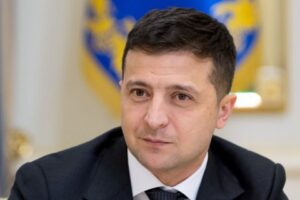
Ukrainian President Volodymyr Zelensky congratulated Jews on the holiday of Pesach.
“Congratulations to Jews around the world on the occasion of the bright Pesach holiday! May goodness fill our homes and peace reign in our lands and hearts. Concord to all who celebrate Pesach today! Hag Pesach sakeach! ” he wrote on Twitter on Wednesday.
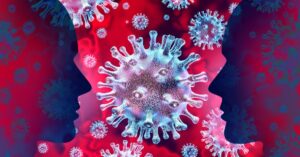
Coronavirus Omicron XBB.1.5 has been diagnosed in patients throughout Ukraine, except in Kirovograd region, experts expect it to appear in patients in the near future.
This is reported by the Center for Public Health with reference to the data of the reference laboratory for the diagnosis of HIV/AIDS, viral and especially dangerous pathogens, which confirmed the circulation of this variant of coronavirus in the vast majority of regions of the country.
At the same time, the CDC notes that this variant of the virus has already been confirmed in wastewater in Kirovograd region.
“This is the first finding of this variant of “omicron” in wastewater. This means that there will soon be patients with this diagnosis. The circulation of Omicron XBB.1.5 in all oblasts is already a matter of days”, says Irina Demchishina, head of the reference laboratory for the diagnosis of HIV/AIDS, viral and especially dangerous pathogens of the CHO.
The CDC reminds us that the Omicron strain is clinically more easily tolerated by patients, but it is transmitted faster.
The CDC urged Ukrainians to be vaccinated against COVID-19.
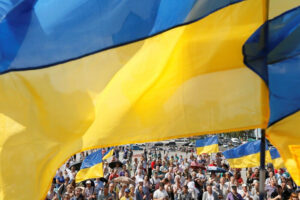
The overwhelming majority of residents of all regions of Ukraine express a negative attitude towards the Russian Federation, according to the results of a sociological survey conducted by the Razumkov Center sociological service.
“Negative attitude is most often expressed towards Russia (94%), Belarus (81%), Iran (73.5%), China (60%), Hungary (46.5%). Negative attitudes towards Russia are expressed by the vast majority of residents of all regions – from 90% of the eastern region to 97% of the central region,” reads the press release on the results of the survey.
The researchers also specify that 95.5% of those who communicate mainly in Ukrainian at home have a negative attitude towards Russia and 88% of those who communicate in Russian.
At the same time, according to the results of the poll, only 2% of respondents express a positive attitude to citizens of the Russian Federation, 77% express a negative attitude and 14% express a neutral attitude.
“Positive attitude to citizens of Russia is expressed by 4% of residents of the eastern and southern regions, 2% of residents of the central region and 0% of residents of the western region. Negative attitude is expressed by 70%, 56.5%, 80% and 84%, respectively. Among those who communicate primarily in Ukrainian at home, a positive attitude towards citizens of Russia is expressed by 0.6%, among those who communicate in Russian – 5%, negative attitude – 82% and 59.5%, respectively,” – indicate the Razumkov Centre.
In addition, the vast majority (97%) of respondents have a negative attitude towards the government and the Russian State Duma.
At the same time, Ukrainians more often express a positive attitude towards Poland (94%), Great Britain (91%), Lithuania (91%), Estonia (90%), Latvia (90%), Canada (90%) and the Czech Republic (88%), The USA (88%), Netherlands (86%), France (86%), Germany (85%), Moldova (82,5%), Slovakia (82,5%), Israel (75%), Japan (74%), Turkey (72,5%), Georgia (70%), Romania (69%), Armenia (66%), Azerbaijan (65%). The relative majority (46%) have a positive attitude towards India.
The sociological service of the Razumkov Center conducted a sociological survey “Orientations of Ukrainian citizens in foreign policy, assessments of government foreign policy and attitudes toward foreign states and politicians” on February 22 – March 1, 2023, in the framework of MATRA program, financed by the Embassy of the Kingdom of the Netherlands in Ukraine.
The face-to-face survey was conducted in all regions of Ukraine, except for the temporarily occupied territories of Donetsk, Zaporizhzhia, Luhansk, Kharkiv and Kherson regions, Crimea and territories where hostilities are taking place.
Representatives of the Razumkov Center’s social service interviewed 2020 respondents aged 18 years and older. The theoretical sampling error does not exceed 2.3%. At the same time, additional systematic sampling deviations may be due to the consequences of the Russian aggression, in particular, the forced evacuation of millions of citizens.

Free Wi-Fi will appear at checkpoints on the western border, the State Border Guard Service of Ukraine said.
“The secure network can already be used by travelers who cross “Shehyni”. Before the end of April, Wi-Fi zones will appear in more checkpoints “Krakivets”, “Rava-Russkaya”, “Yagodin”, “Porubnoe”, “Krasnoilsk” and “Dyakivtsy”, – said in a message of the State Border Service of Ukraine in Telegram-channel on Wednesday.
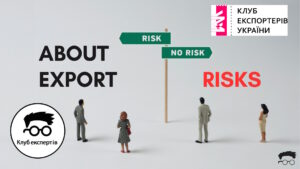
A new video has been released on the YouTube channel of the Club of Experts, in which the Kyiv-based think tank Club of Experts and the Ukrainian Exporters Club presented a joint study on the main risks facing Ukrainian companies in exporting goods in 2023.
Yevheniia Lytvynova, President of the Ukrainian Exporters Club, emphasized that exporters should consider five key risks for their business: currency risk, payment risk, production risk, transportation risk, and bureaucratic risk.
“Understanding these risks is critical for successful exports, especially in the current geopolitical situation, exporters should consider these risks and plan at least 3 months in advance when cooperating with foreign companies,” Lytvynova said.
The experts also reviewed the state of Ukrainian exports in recent years.
“Over the past year, the situation in Ukrainian exports has undergone significant changes. Poland, Romania, and Turkey have become Ukraine’s main trading partners,” explained Maksym Urakin, founder of the Club of Experts.
He added that in 2022, Ukraine exported goods worth $44 billion, which is 35% less than in the previous year. The main profit in the global market came from the export of grains and vegetable oils, although exports of metallurgical products declined.
The Club of Experts and the Club of Exporters also emphasized the importance of supporting Ukrainian exporters in the current global market environment.
“We recommend Ukrainian exporters to contact our clubs with questions about certification, access to foreign markets and opening production facilities abroad. We are always ready to help and advise,” emphasized Yevgeniya Litvinova.
She urged Ukrainian companies to be active in the global market.
“We want Ukrainian companies to maintain competitive prices for their goods while working with foreign partners. Do not hesitate to contact us with any questions related to exports,” added Ms. Litvinova.
Yevheniya Lytvynova urged Ukrainian companies not to lose hope and to actively develop their capabilities.
“Ukrainian exports have great potential, and we believe that cooperation with the Club of Experts and the Club of Exporters will help companies realize it,” she said.
In conclusion, the speakers noted that they plan to devote the next session to imports and import-related risks. They called on all stakeholders to join the discussion and explore new opportunities for the development of export-import business in Ukraine.
The experts also emphasized that in order to enter new export markets and verify counterparties around the world, we suggest that Ukrainian exporters consider products and solutions from Dun & Bradstreet, the world leader in the market of information on legal entities.
Watch the full video here:
You can subscribe to the Club of Experts channel by clicking here:
CLUB_OF_EXPERTS, CLUB_OF_EXPORTERS, EXPORT, EXPORT RISKS, IMPORT, INCOTERMS